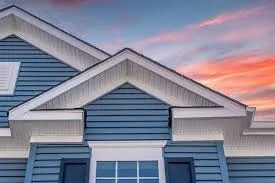Vinyl siding has become popular for homeowners looking to enhance their property’s appearance and efficiency. Not only does it offer a sleek, modern look, but it also brings significant benefits when it comes to energy efficiency. We will explore how All Weather Exteriors LLC of Manchester vinyl siding helps maintain consistent indoor temperatures and reduce energy costs, making it a valuable investment for many homes. By understanding how vinyl siding impacts your home’s energy performance, you can make an informed decision about its potential benefits for your household.
Enhanced Insulation with Vinyl Siding
Vinyl siding provides an additional layer of insulation for your home, which can significantly contribute to improved energy efficiency. When installed properly, it helps to reduce heat transfer between the interior of your home and the outside environment. This means that the heat generated by your heating system stays inside during the winter, while in the summer, the cool air from your air conditioning system is retained. Vinyl siding with foam backing, in particular, offers enhanced thermal insulation compared to traditional siding materials. This added layer of insulation helps maintain a comfortable indoor temperature and reduces the workload on your HVAC system, leading to lower energy consumption and cost savings.
Reduced Air Leakage
Another advantage of vinyl siding is its ability to minimize air leakage, crucial in enhancing energy efficiency. Air leaks around windows, doors, and other building joints can lead to significant energy losses as conditioned air escapes and unconditioned air enters. Vinyl siding, when installed with proper sealing techniques, helps to create a more airtight barrier, preventing drafts and reducing the likelihood of air leaks. By addressing these gaps, vinyl siding helps maintain a stable indoor environment, reducing the need for constant heating or cooling. As a result, homeowners can experience lower energy bills and improved overall comfort.
Durability and Maintenance Benefits
The durability of vinyl siding also contributes to its role in improving energy efficiency. Unlike other siding materials that may require frequent maintenance or replacement, vinyl siding is known for its long-lasting performance. Its resistance to weather elements, such as rain, wind, and UV rays, ensures that it retains its insulating properties over time. Additionally, vinyl siding does not require painting, which eliminates the need for frequent touch-ups or repairs. This low-maintenance nature means that homeowners can enjoy sustained energy efficiency benefits without the added hassle of regular upkeep. Investing in a durable siding option like vinyl ensures that your home remains energy-efficient for years to come.
Cost-Effectiveness of Vinyl Siding
Vinyl siding offers a cost-effective solution for improving your home’s energy efficiency. Compared to other siding materials, vinyl siding is relatively affordable in terms of initial installation and long-term maintenance. The energy savings achieved through improved insulation and reduced air leakage can offset the installation cost. Additionally, the reduced need for HVAC system use translates into lower utility bills, further enhancing the cost-effectiveness of vinyl siding. For homeowners seeking a budget-friendly way to improve their home’s energy performance, vinyl siding presents a practical and economical choice.
Aesthetic Versatility and Energy Efficiency
Beyond its energy efficiency benefits, vinyl siding adds aesthetic versatility to your home. Homeowners can achieve their desired look while improving energy performance, and it is available in a wide range of colors, textures, and styles. The ability to customize the appearance of your home without compromising on efficiency is a significant advantage. Whether you prefer a classic, traditional look or a modern, contemporary design, vinyl siding can accommodate your preferences while contributing to a more energy-efficient home. This combination of aesthetic appeal and functionality makes vinyl siding an attractive option for homeowners looking to enhance their property’s appearance and performance.
Environmental Benefits of Vinyl Siding
Vinyl siding also offers environmental benefits that align with sustainable living practices. Its energy-efficient properties contribute to reducing a home’s overall carbon footprint. By improving insulation and reducing the need for excessive heating and cooling, vinyl siding helps decrease energy consumption, lower fossil fuel demand, and reduce greenhouse gas emissions. Additionally, many vinyl siding products are manufactured with recycled materials and are recyclable, adding another layer of environmental responsibility. Choosing vinyl siding improves your home’s energy efficiency and supports broader efforts toward environmental conservation, making it a choice that benefits both your household and the planet.
Vinyl siding offers a range of benefits that contribute to improved energy efficiency in the home. From enhanced insulation and reduced air leakage to its durability and cost-effectiveness, vinyl siding provides a practical solution for homeowners seeking to lower their energy bills and maintain a comfortable indoor environment. Its aesthetic versatility further adds to its appeal, allowing homeowners to achieve their desired look without sacrificing efficiency. By choosing vinyl siding, you are investing in a material that not only enhances the visual appeal of your home but also contributes to its overall energy performance, making it a worthwhile consideration for many households.






